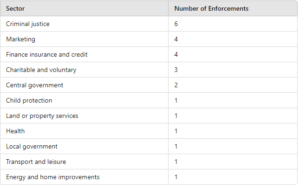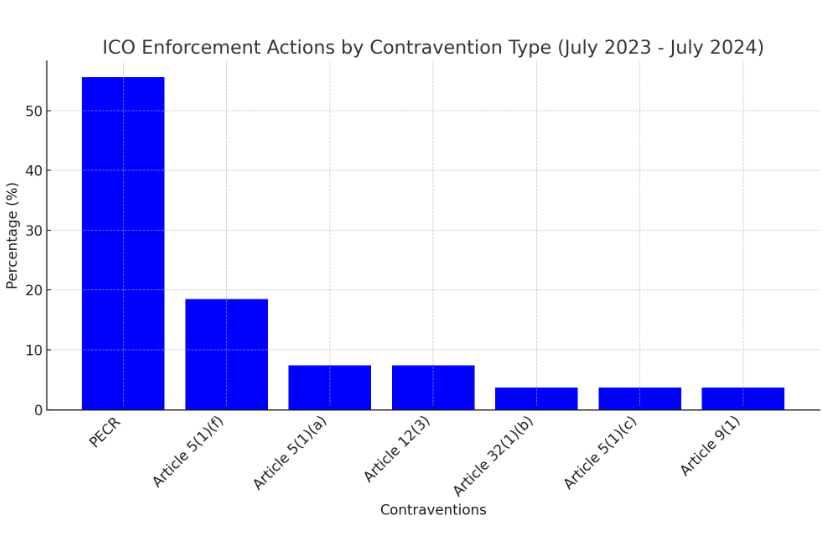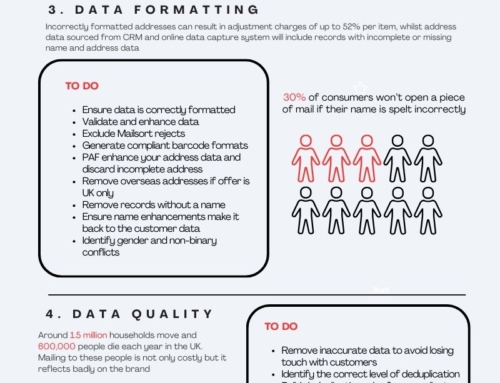Our analysis of ICO’s enforcement actions over the past 12 months (July 2023-July 2024) reveals important trends in data governance and highlights the ongoing challenges organisations face in maintaining data privacy. It indicates a predominant focus on the Privacy and Electronic Communications Regulations (PECR):
- PECR: 55.56%
- Article 5(1)(f): 18.52% (Integrity and confidentiality of personal data)
- Article 5(1)(a): 7.41% (Lawfulness, fairness, and transparency)
- Article 12(3): 7.41% (Transparent information, communication, and modalities for exercising the rights of the data subject)
- Article 32(1)(b): 3.70% (Security of processing)
- Article 5(1)(c): 3.70% (Data minimization)
- Article 9(1): 3.70% (Processing of special categories of personal data)
Trends and Observations:
- Predominance of PECR Violations: Over half of the enforcement actions were related to PECR. This underscores the ICO’s focus on ensuring that organisations adhere to regulations governing electronic communications, particularly concerning direct marketing practices.
- Focus on Data Security (Article 5(1)(f)): The second most cited contravention was Article 5(1)(f) of the General Data Protection Regulation (GDPR), which pertains to the integrity and confidentiality of personal data. This indicates a critical need for organisations to enhance their data security measures to prevent breaches and unauthorised access.
- Sector-Specific Issues: Several enforcements involved central government and criminal justice sectors. For instance, the Ministry of Defence faced a substantial fine of £350,000 for violations related to data security. These cases highlight persistent challenges within these sectors to comply with data protection standards.
- Recurrent Issues with Direct Marketing: Many enforcements were against organisations involved in direct marketing, such as telemarketing companies. Violations often involved unsolicited communications and inadequate consent mechanisms, reflecting the ongoing struggle to balance marketing practices with privacy laws.
League Table of Sectors with ICO Enforcements:
The following league table of ICO enforcements reveals that the criminal justice sector faced the most enforcement actions, with six cases, followed by the marketing and finance insurance and credit sectors, each with four enforcements. Charitable and voluntary organisations had three enforcements, while central government entities had two. Other sectors, including child protection, land or property services, health, local government, transport and leisure, and energy and home improvements, each experienced one enforcement action. This distribution highlights particular compliance challenges in the criminal justice, marketing, and finance sectors

Contrast with Previous Year:
This year there has been a notable shift in the focus of ICO enforcement. In 2023, the primary concern highlighted was data processing security, particularly within sectors like finance and healthcare. The enforcement actions were predominantly focused on breaches involving inadequate security measures and failure to comply with data minimisation principles. This year, while data security remains a significant concern, there is a marked increase in actions related to PECR violations, especially in the context of direct marketing practices.
This shift indicates a broader regulatory focus on protecting consumers from intrusive marketing practices and ensuring that organisations respect privacy in their electronic communications. The number of PECR-related enforcements suggests an increasing scrutiny on how organisations manage consent and communication preferences, reflecting the evolving landscape of data protection priorities.
Comments Martin Rides, Managing Director of The Software Bureau:
“The number of PECR-related enforcements reflects the ICO’s intensified scrutiny on marketing practices, signalling a clear message to organisations about the importance of respecting consumer privacy and obtaining proper consent in their communication strategies. This analysis not only sheds light on the prevalent issues but also underscores the critical importance of maintaining robust data hygiene practices. It serves as a call to action for organisations to bolster their data protection frameworks and stay vigilant in their compliance efforts.”





